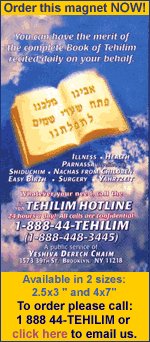A PURIM THOUGHT
The Talmud says [Chulin 139b] that the Torah contains an allusion to Mordechai, found in an ingredient of the Ketores [Incense]. The words “Mor Dror” [Shmos 30:23] are translated into Aramaic as “Mor dechi.”
This type of Talmudic passage obviously requires illumination. The Rabbis must be telling us something more than a mere play on words.
The commentaries tell us that the reason why the Jews were in such dire straits at the time of the Purim story is because they were not functioning as the Jewish people are supposed to function. Our single greatest strength is that of being a unified nation. When there is division and dissension, when there is baseless hatred, we lose one of our strongest attributes. We are no longer a Tzibbur [unified group of people]. We are merely a group of divisive individuals.
As a Tzibbur, even if there are those who are blemished among us, we can persevere. If, however, the light of justice is shined on each of us or any of us individually, we will not be able to endure. Our strength exists only as a Tzibbur.
Achashverosh posed the question to Haman – “How are you going to wipe out the Jews? No one has ever managed to successfully accomplish that goal.”
Haman responded, “This time it will be different because ‘There exists a nation which is spread out and divided amongst us’ [Esther 3:8].” Haman suggested that the Jewish people were very vulnerable at this juncture in their history because they were a divided and divisive people. They had lost their identity as a Tzibbur. There was back-stabbing. There was finger-pointing. There were people who participated in the infamous party of Achashverosh. They were less than they were supposed to be, and they were plagued by divisiveness. Therefore, Haman suggested, “They are ours to be had.”
How did Mordechai react to Haman’s evil designs? The antidote to this evil plan was “Go, gather all the Jews” [Esther 4:16]. If we can achieve unity and put away our dissension and divisiveness, then we will once again regain the powerful attribute of being the “Jewish People.”
Who gave Mordechai the right to “Gather all the Jews”? After all, there were sinners in the nation. There were those who participated in Achashverosh’s party.
Rav Yonason Eibshutz (1695-1764) wrote in his Yearos Devash that this explains the allusion to Mordechai. Our Rabbis tell us that the Incense contained Chelbanah. On its own, this ingredient was a terribly malodorous spice. However, when it was mixed with the rest of the spices in the Ketores, even the Chelbanah gave off a pleasing aroma.
The Rabbis are asking, “Where do we see the efficacy of Mordechai’s proposal to gather all the Jews together, despite the fact that some were certainly sinners whose actions were not pleasing to G-d?” The answer is that this idea is alluded to by the ingredients of the Ketores, which begin with the ingredient “Mor Dror.”
Rabbi Yissacher Frand
Posted by hayld@mac.com on Monday, May 16th, 2016 @ 10:08AM
Categories: Purim



